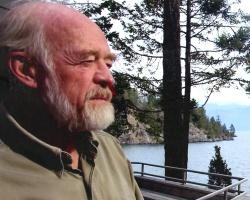In the youth ministry world, Eugene Peterson is perhaps best known for his work in translating the Bible into contemporary language in The Message. In addition to being a prolific author, Eugene is also a ministry veteran, having pastored a church for 29 years. In his latest book, The Pastor: A Memoir, Eugene shares his long journey in ministry and the wisdom he has garnered from it. In the process, he explores what the church is and the role of language and imagination in faith formation.
Youth Worker Journal: In The Pastor, you talk about wrestling with the questions, “What is church? Why church?” How would you answer those questions today?
Eugene Peterson: The church is the gift of the Holy Spirit to provide a witness to the nature of the gospel and a context in which people can mature in following Jesus. The kingdom of God is larger than the church. There’s a lot more that God is doing in the world. It’s the responsibility of pastors and youth leaders to take seriously. If we don’t do this, the world loses a chance to see what’s going on at the very heart of things.
YWJ: Throughout The Pastor, you emphasize the importance of congregational worship. How does worship shape the people of God?
Eugene: Worship provides a protected space from distraction, noise, gossip and triviality. By entering into a place of worship—a sanctuary, a holy place—with people who care about the same things you do, you can shape a vocabulary in a way that isn’t available any other way. The Christian faith is not an individualistic thing. It always has to be in some kind of community. Congregations need to be careful to avoid a separate youth culture; to avoid making worship entertainment. One of the fallouts of the entertainment approach is that when teens get out of youth group and go to church, they’re bored. They don’t understand what’s going on, so they drop out. The fallout from this is devastating. We can have fun and do things that are exciting, but there’s more to it than that. It’s a mistake to develop a youth culture separate from the congregation.
YWJ: Why is it important for communities to develop a vocabulary of faith?
Eugene: Language is in bad repair these days. We have a secularized language that isn’t adequate for noticing what’s going on in terms of salvation and grace. When I first started bird watching 40 years ago, all we knew were robins and crows. We didn’t even see other things because we didn’t have a vocabulary for them. If you don’t have a name for it, you probably don’t notice it. A vocabulary of faith sharpens our participation in and allows us to notice what God is doing in the world and gives us a way to communicate that to people.
YWJ: How can congregations help teens to develop a vocabulary of faith?
Eugene: By hanging around with them. My son is a pastor. He’s doing something with confirmation that is quite extraordinary. He has 15 young people in this class. He’s invited 15 adult members of the congregation to meet with them. These adults don’t have any responsibility except to be there and learn the names of these kids; to listen to them and participate in the conversation in a very reticent way. This is the best confirmation class he’s ever had because it’s about community. The youth are not a special project or problem. They’re part of the congregation. Youth aren’t used to being treated that way.
YWJ: As a pastor-writer, you clearly value the imagination. How is imagination related to faith?
Eugene: They’re very closely linked. Most of what we’re doing in faith is invisible and inaudible. The imagination is a way that we can organize experiences, ideas and knowledge. If we have a developed imagination, which often takes the form of story and can develop in terms of songs and other art forms, we’re not nearly as confined to what we can see, hear and touch. Imagination lets us see the invisible and connect memories and expectations. Imagination keeps that world alive.
YWJ: The excerpt from Chapter 3, “My Mother’s Songs and Stories” of your book The Pastor. In this chapter, it’s obvious that your mother’s gift as a storyteller and her ability to enable you to see yourself in the sacred stories of our faith powerfully shaped your identity as a follower of Christ. What can youth workers do to kindle the imaginations of their students in the same way your mother nurtured your imagination?
Eugene: Tell stories. Be familiar with some of the good storytellers. Some of the classic storytellers of our time are C.S. Lewis and Tolkien. Teenagers are not too old to be acquainted with those stories. Get kids to tell their own stories. Young people are eager to be part of a story if we give them a chance instead of asking questions about doctrine. We need to continue inhabiting the world of story with our teens.




